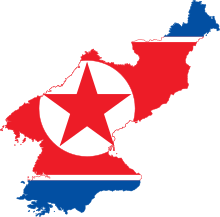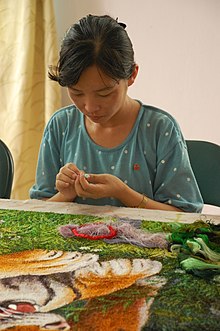A | B | C | D | E | F | G | H | CH | I | J | K | L | M | N | O | P | Q | R | S | T | U | V | W | X | Y | Z | 0 | 1 | 2 | 3 | 4 | 5 | 6 | 7 | 8 | 9
 The North Korea Portal The North Korea PortalIntroduction North Korea, officially the Democratic People's Republic of Korea (DPRK), is a country in East Asia. It constitutes the northern half of the Korean Peninsula and borders China and Russia to the north at the Yalu (Amnok) and Tumen rivers, and South Korea to the south at the Korean Demilitarized Zone. North Korea's border with South Korea is a disputed border as both countries claim the entirety of the Korean Peninsula. The country's western border is formed by the Yellow Sea, while its eastern border is defined by the Sea of Japan. North Korea, like its southern counterpart, claims to be the legitimate government of the entire peninsula and adjacent islands. Pyongyang is the capital and largest city. The history of present-day Korea began with the foundation of Gojoseon in 2333 BC by the mythic king Dangun, but no archaeological evidence and writing was found from this period. Following the unification of the Three Kingdoms of Korea under Unified Silla in 668 AD, Korea was subsequently ruled by the Goryeo dynasty (918–1392) and the Joseon dynasty (1392–1897). In 1897, King Gojong proclaimed the Korean Empire, which was annexed by the Empire of Japan in 1910. In 1945, after the Japanese surrender at the end of World War II, Korea was divided into two zones along the 38th parallel, with the north occupied by the Soviet Union and the south occupied by the United States. In 1948, separate governments were formed in Korea: the socialist and Soviet-aligned Democratic People's Republic of Korea in the north, and the capitalist, Western-aligned Republic of Korea in the south. The Korean War began when North Korean forces invaded South Korea in 1950. In 1953, the Korean Armistice Agreement brought about a ceasefire and established a demilitarized zone (DMZ), but no formal peace treaty has ever been signed. Post-war North Korea benefited greatly from economic aid and expertise provided by other Eastern Bloc countries. However, Kim Il Sung, North Korea's first leader, later purged both pro-Soviet and pro-Chinese elements from the ruling Workers' Party of Korea and promoted his personal philosophy of Juche as the state ideology. Pyongyang's international isolation sharply accelerated from the 1980s onwards as the Cold War came to an end. The fall of the Soviet Union in 1991 then brought about a sharp decline to the North Korean economy. From 1994 to 1998, North Korea suffered a famine that resulted in the deaths of between 240,000 and 420,000 people, and the population continues to suffer from malnutrition. North Korea is a totalitarian dictatorship with a comprehensive cult of personality around the Kim family. The country is widely considered to have the worst human rights record in the world. Officially, North Korea is an "independent socialist state" which holds democratic elections; however, independent observers have described the elections as sham elections. The Workers' Party of Korea is the ruling party of North Korea and leads the Democratic Front for the Reunification of Korea, the sole legal political movement in the country. According to Article 3 of the constitution, Kimilsungism–Kimjongilism is the official ideology of North Korea. The means of production are owned by the state through state-run enterprises and collectivized farms. Most services—such as healthcare, education, housing, and food production—are subsidized or state-funded. (Full article...) Selected article -The status of women in North Korea is not fully understood outside the country, due to the political isolation of North Korea, the unwillingness of the North Korean authorities to allow foreign investigators access in the country, and the existence of conflicting reports. The official position of the North Korean government is that women have equal rights with men. North Korea has enacted laws such as the Law on Sex Equality, the Labor Law, and the Law on Nationalization of Essential Industries. Although these social systems have not entirely been successful, they have been integrated into daily life to help women. The reforms implemented provided women's rights at work, rights of inheriting and sharing of properties, and rights of free marriage and divorce. North Korea also outlawed polygamy. The state confiscated all privately owned land, in theory eliminating property discrimination. Today, women in North Korea participate in a variety of labor forces, and there is a considerable number of women who are in high positions. Also, there are many facilities for women including sanatoria, rest homes, and maternity hospitals. The ratio of women to men in high wage jobs is considerably lower than that of low wage jobs. In addition, most women in high positions in society are either relatives or wives of top leaders. Irrespective of the reforms attempting to weaken patriarchal social structures, the political atmosphere is an example of the same patriarchal structure that the reforms intended to dissolve. This demonstrates the degree to which Neo-Confucian ideals still permeate and affect social and political policies. North Korea has not followed China, Laos, Cambodia and Vietnam in their campaigns against Confucianism. (Full article...)CategoriesRelated portalsCommunist countries in Asia Other countries North Korea in the news
Selected image -Did you know (auto-generated)
More did you know
General images -The following are images from various North Korea-related articles on Wikipedia.
North Korea topicsThings you can do
Associated WikimediaThe following Wikimedia Foundation sister projects provide more on this subject:
Web resources
Notes Discover Wikipedia using portals |
>Text je dostupný pod licencí Creative Commons Uveďte autora – Zachovejte licenci, případně za dalších podmínek. Podrobnosti naleznete na stránce Podmínky užití.
Text je dostupný za podmienok Creative
Commons Attribution/Share-Alike License 3.0 Unported; prípadne za ďalších
podmienok.
Podrobnejšie informácie nájdete na stránke Podmienky
použitia.















































